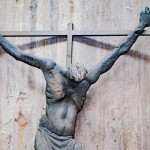
With the reading of the passion of Jesus Christ, we celebrate the triumph of the king who does not wish to inflict pain and arrogance, indeed he is preparing to submit himself. Our “yes” is the memory of a solemn and joyous procession, but as if to prevent any possible misunderstanding about that triumph, the liturgy of Palm Sunday anticipates, by the reading of the passion of the Lord, his burial. Jesus Christ is acclaimed by the crowds, and he knows what will happen to him: he has come to die, but like the grain of wheat that dies in the ground he will then rise as a life-giving food for all.
These two aspects of the Pascal mystery – the immolation and the glory – are indissoluble. The Messenger of God, the Son of David, savoring an hour of cheers and praise, is in reality already a designated and conscious victim: he knows that he will proceed from the cheering people to be immolated on the altar of his sacrifice, which will happen on the top of Golgotha, and that the time is approaching.

With these sentiments and resolutions we enter into the great and sacred Holy Week, which is at the heart of the Christian year. We enter with re-invigorated hope, reassured by the fact that Jesus Christ has joined himself to a path of loss and abandonment. He is the symbolic representation of the entire family of Adam, all filled with worry and fatigue, but all destined to receive the incredible, Divine mercy.
After Jesus Christ has felt the full brunt of abandonment, no one will be left alone or left in desperation. And this is good news for all of us.



